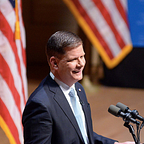91 projects proposed, approved and funded. What’s next, Boston?
There are 23 different neighborhoods across the City of Boston. We’re all one Boston, but each neighborhood has its own unique character, history, and traditions and culture. That’s one of the reasons why I love being the Mayor here. Each neighborhood deserves to be highlighted and enhanced. Adopting the Community Preservation Act was a great way to do just that.
In 2000, the Massachusetts State Legislature enacted the Community Preservation Act (CPA). Under this law, cities and towns across the Commonwealth are able to adopt the act and are then eligible to receive funding for constituent-driven projects. Specifically, this money is to be used for affordable housing, historic preservation, or open space, parks or outdoor recreation.
In a ballot question in November 2016, Boston voters approved adoption of the CPA with a 74 percent vote of support, joining 175 other communities across the Commonwealth in enacting the law. Two years later, the first round of funding was implemented, and approved project proposals began construction. Currently, we’re accepting new applications until September 27, 2019 at 4:00 p.m.
Money for selected projects comes from the municipality itself through a local CPA property tax surcharge, in Boston it’s one percent. Since its implementation, Boston has raised about $25 million each year for CPA projects. These projects span across every neighborhood.
Additionally, the State chips in a match to communities that have enacted the CPA from the Community Preservation Trust Fund. This past year, as part of my 2019 legislative agenda, I advocated for an increased state match at the State House. I am happy to report that instead of the current 11 percent match we’ll receive closer to 30 percent in the coming years, allowing for more investments in our neighborhoods.
I want these projects to come from you, to reflect the interests of Boston residents, and to be specific to your own community because each neighborhood is unique in how it enhances our City’s overall character. Every neighborhood has its own historic site to preserve or open space to build or residents to house in affordable units. Residents know best what needs to be done within their individual community, and after all, that’s why so many of you voted for it.
How does this all work? With the approval from you, the voter, the Community Preservation Fund was created to finance project proposals. The state law requires the establishment of a committee to review and recommend projects. I partnered with the Boston City Council and created Boston’s Community Preservation Committee (CPC). The committee is made up of nine members — five represent City boards and commissions and the other four at-large members were appointed by the City Council. The green light on any proposed project requires review and recommendation from the CPC and a final vote and appropriation by the City Council.
The purpose of adopting the Community Preservation Act in Boston was to promote and preserve individuality and diversity in each neighborhood. We encourage proposals to come from community organizations and nonprofits, housing developers, neighborhood coalitions, recreation associations, and historical societies.
